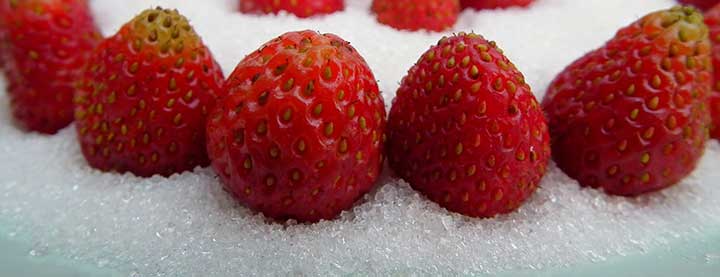Given the new information about the sugar industry paying researchers to downplay the role sugar has in heart disease, finding sugar alternatives to sweeten our food with seems to be an important task.
Finding an alternative to sugar isn’t something new. Those who want to watch their weight, their blood sugar levels, or would rather eat healthier than sugary recipes allow have been getting creative finding alternatives. So we’ve decided to talk a little bit about the best and worst alternatives you can use.
The worst alternative sweeteners you can use instead of sugar are aspartame, sucralose, and fructose (including agave).
Aspartame
There’s nothing natural about aspartame. It’s a synthetic chemical found in Equal, Spoonful, AminoSweet, Benevia, NutraTaste and many “diet” foods and beverages. While not confirmed, it is often thought that aspartame can lead to cancer, birth defects, and weight gain.
Sucralose
Sucralose is most commonly found as the sweetener Splenda. Just like aspartame, sucralose, is synthetically created in a laboratory. Susan S. Schiffman a PhD and adjunct professor at North Carolina State University, says sucralose was previously thought non-metabolized, however, recent findings show otherwise. This creates a new slew of problems.
According to the Schiffman’s study, sucralose reduces good gut bacteria, can make medications less effective, releases toxins, and may alter your body’s responses.
Fructose
Fructose, while not an artificial sweetener, can still be health harming. It is a natural sugar found in all fruits, and is really only dangerous when consumed in large doses and chronically. You might think you’re safe then, right? Unfortunately, most people consume about 500% more than in pre-industrial times, which can cause metabolic toxicity. Remember, this is in large doses where it can become a pathogenic, small doses are harmless.
Deemed unhealthy, your body metabolizes fructose into fat much quicker than any other sugar. When your liver metabolizes fructose, it promotes the dangerous type of fat. Named adipose fat and associated with a greater risk of heart disease, it’s what we aim to avoid in our diets.
Along with glucose, fructose makes up “sucrose” or table sugar, which is one of the reasons fructose is harmful. In the Turku studies, one of the arms of study was fructose, and many participants in that arm transferred to the xylitol arm because of the side effects of fructose.
In addition, fructose fools your metabolism by turning off your body’s appetite control system. Often times, this causes you to gain weight.
So what should you use instead of these sugar alternatives?
Studies are showing that the best things to use instead of sugar are stevia, honey, and sugar alcohols, like xylitol.
Why Xylitol?
Sugar alcohols tend to not be quite as sweet as sugar, but they are close and, generally, a 1:1 ratio in recipes is fine. They also contain fewer calories and carbs. This is because sugar alcohols like xylitol are not completely absorbed into your body.
Unlike some other sugar alcohols, xylitol does not spike blood sugar much at all. This makes it a perfect solution for diabetics. Xylitol comes with added benefits like fighting tooth decay when you use it properly and get enough doses throughout the day.
Related Articles
Is Your Dentist Recommending Xylitol? Why Not?
Xylitol is the most effective way of preventing tooth decay we know of.
Does Xylitol Make a Good Sweetener?
Health conscious people recognize that sugar and artificial sweeteners present serious problems for your body. Over the years, artificial sweeteners have been linked to everything from neurological disorders to cancer, and more. While the results of these studies are...
Great Ways to Use Xylitol as a Sugar Substitute
Xylitol sugar substitute options are almost endless. If you’ve never used xylitol, then you are in for a treat, literally! The different ways that you can use xylitol is nothing short of amazing. Let’s take a look at why this natural sweetener deserves a place in any...
Xylitol in the Diabetic Diet
The author this paper, H. Mehnert, is a German diabetologist who helped promote the use of implantable insulin pumps more than 40 years ago. He realized how much of a problem has come from our overuse of foods that contain sugars or, like...
The Benefits of Gum with Xylitol
The health and dental benefits of xylitol are numerous and, in fact, are so impressive that many people are left shocked. What is it about xylitol that makes it so beneficial? Why is xylitol such a perfect ingredient for gum and other dental...
Xylitol Research
Dental Benefits There is no better way to begin addressing this than to look at Kauko Makinen's work. He has been looking at xylitol and tooth decay from the beginning with the Turku sugar studies. Here is what he wrote this week (September 4,...









What’s your view on Erythritol? And how does it compare to Xylitol?
Thank you
Erythritol is also a flexible 5 Carbon sugar alcohol that should have some of the same properties as xylitol. One recent study reports it as better than xylitol. It’s available here if you want to read it. The problem with it is that the major authors work for Cargill, the company that makes erythritol. K Makinen, one of the other authors feels the data were loaded.
I don’t think anyone really knows yet why or how 5 carbon sugar alcohols have these effects on bacteria. The bacteria do ingest them and can’t handle them when they do. But they can also fit into the ‘hands’ (lectins) the bacteria use to hang on to their hosts. If they can’t hang on they are not a problem.